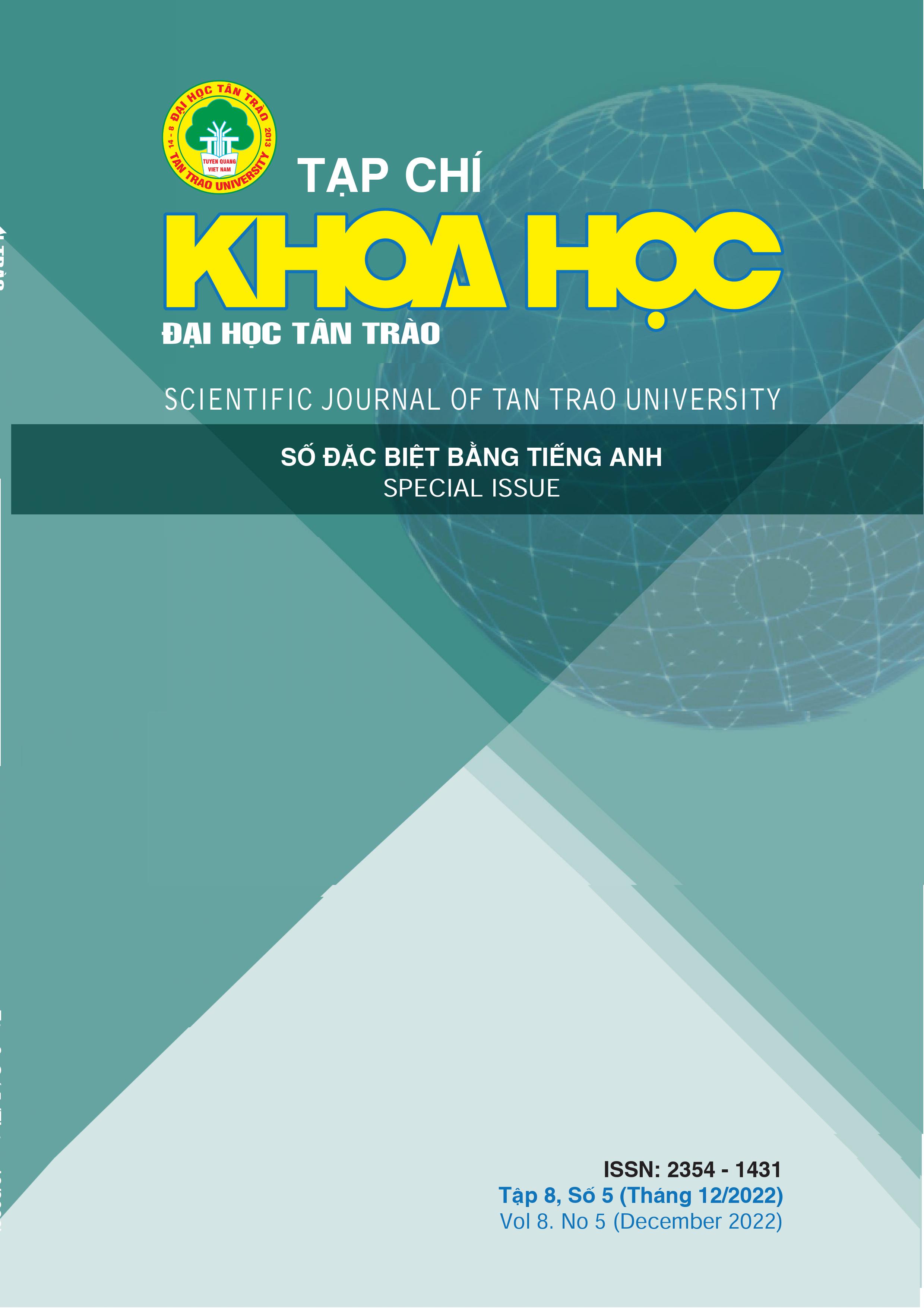TEACHER’S AND STUDENTS’ PERSPECTIVES TOWARDS DIGITAL TRANSFORMATION IN ENGLISH LANGUAGE TEACHING AND LEARNING DURING COVID-19 PANDEMIC
DOI:
https://doi.org/10.51453/2354-1431/2022/874Keywords:
digital transformation; concern; attitude; teaching and learning; applicabilityAbstract
Teaching and learning languages, especially English, online through digital transformation is an extremely correct, convenient and beneficial strategy for the education of the country in general and Hanoi Law University in particular. Digital transformation in training is currently a matter of great concern and promotion, especially in the midst of complicated changes in the Covid-19 epidemic, it is impossible to determine with certainty when it will be completely stable so that education can return to the normal teaching state as before. Therefore, this study used a descriptive quantitative approach to find out the attitudes of teachers and students towards Digital Transformation in English language teaching and learning at Hanoi Law University during the Covid-19 pandemic. The study concludes that the most obvious challenges are those related to accessing and adapting to new teaching and learning technologies. Based on the findings, teachers and learners would consult to adapt themselves to renovative pedagogical practices and learning styles, respectively.
Downloads
References
REFERENCES
/[1]. Strielkowski, W. (2020). COVID-19 Pandemic and The Digital Revolution in Academia and Higher Education. Preprints, April, 1-6. https://doi.org/10.20944/preprints202004.0290.v1
/[2]. Bahasoan, A. N., Ayuandiani, W., Mukhram, M., & Rahmat, A. (2020). Effectiveness of online learning in pandemic COVID-19. International Journal of Science, Technology & Management, 1(2), 100-106. https://doi.org/10.46729/ijstm.v1i2.30
/[3]. Liguori, E., & Winkler, C. (2020). From Offline to Online: Challenges and Opportunities for Entrepreneurship Education Following the COVID-19 Pandemic. Entrepreneurship Education and Pedagogy, 3(4), 346–351. https://doi.org/10.1177/2515127420916738
/[4]. Adedoyin O. B., & Soykan, E. (2020). Covid-19 pandemic and online learning: the challenges and opportunities. Interactive Learning Environments, 28(1), 1-13. https://doi.org/10.1080/10494820.2020.1813180
/[5]. Thai, D. T., Quynh, H. T., & Linh, P. T. T. T. (2021). Digital transformation in higher education: an overview study. TNU Journal of Science and Technology, 226(09), 139-146. http://jst.tnu.edu.vn/jst/article/view/4366
/[6]. Efriana, L. (2021). Problems of Online Learning during Covid-19 Pandemic in EFL Classroom and the Solution. Journal of English Language Teaching and Literature, 2(1), 38-47. https://jurnal.stkipmb.ac.id/index.php/jelita/article/vie w/74
/[7]. Nguyen, T. M. L. & Hoang, S. T. (2020). Education 4.0: Schools 4.0 meet the development trend of Industry 4.0. Proceedings of the Scientific Conference on Education and Training Innovation for the Goal of Sustainable Development. https://repository.vnu.edu.vn/bitstream/VNU_123/102074/1/KY-484.pdf
/[8]. Piccoli, G., Rodriguez, J. A., Palese, B., & Bartosiak, M. (2017). The Dark Side of Digital Transformation: The Case of Information Systems Education. In A. I. Benedek & G. Molnar, (Ed.), Changing Teaching and Learning Environment by the Digital Transformation, 8th International Conference of Education, Research and Innovation, 2015. https://unesdoc.unesco.org/ark:/48223/pf0000374309
/[9]. Balyer, A., & Oz, O. (2018). Academicians’ Views on Digital Transformation In Education. International Online Journal of Education and Teaching (IOJET), 5(4), 809-830. http://iojet.org/index.php/IOJET/article/view/441/295
/[10]. Susilowati, R. (2020). The Challenges of Online Learning in Listening Class During Covid-19 Pandemic. Edukasi Lingua Sastra, 18(2), 56-72. https://doi.org/10.47637/elsa.v18i2.290
/[11]. Utomo, M. N. Y., Sudaryanto, M., & Saddhono, K. (2020). Tools and Strategy for Distance Learning to Respond to COVID-19 Pandemic in Indonesia. International Information and Engineering Technology Association, 25(3), 383-390. https://doi.org/10.18280/isi.250314
/[12]. Suprianto, S., Arhas, S. H., & Mahmuddin, M. (2020). The Effectiveness of Online Learning Amid the COVID-19 Pandemic. Jurnal Ad'ministrare, 7(2), 321-330. https://ojs.unm.ac.id/administrare/article/view/16441/9574
/[13]. The Prime Minister (2020). National Digital Transformation Program to 2025, orientation to 2030. Decision No. 749/QD-TTg dated June 3, 2020 https://thuvienphapluat.vn/van-ban/Cong-nghe-thong-tin/Quyet-dinh-749-QD-TTg-2020-phe-duyet-Chuong-trinh-Chuyen-doi-so-quoc-gia-444136.aspx
Downloads
Published
How to Cite
Issue
Section
License

This work is licensed under a Creative Commons Attribution-ShareAlike 4.0 International License.
All articles published in SJTTU are licensed under a Creative Commons Attribution-ShareAlike 4.0 International (CC BY-SA) license. This means anyone is free to copy, transform, or redistribute articles for any lawful purpose in any medium, provided they give appropriate attribution to the original author(s) and SJTTU, link to the license, indicate if changes were made, and redistribute any derivative work under the same license.
Copyright on articles is retained by the respective author(s), without restrictions. A non-exclusive license is granted to SJTTU to publish the article and identify itself as its original publisher, along with the commercial right to include the article in a hardcopy issue for sale to libraries and individuals.
Although the conditions of the CC BY-SA license don't apply to authors (as the copyright holder of your article, you have no restrictions on your rights), by submitting to SJTTU, authors recognize the rights of readers, and must grant any third party the right to use their article to the extent provided by the license.


